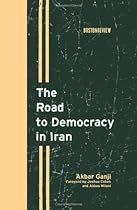Read The Road to Democracy in Iran (Boston Review Books) by Akbar Ganji Online
# Read * The Road to Democracy in Iran (Boston Review Books) by Akbar Ganji ✓ eBook or Kindle ePUB. The Road to Democracy in Iran (Boston Review Books) Most notably, he traced the murders of dissident intellectuals to Iran's secret service. A passionate call for universal human rights and the right to democracy from a Muslim perspective, it lays out the goals and means of Iran's democracy movement, why women's rights trump some interpretations of Islamic law, and how the West can help promote democracy in Iran (he strongly opposes U.S. But, troubled by the regime's repressive nature, he became an investigative journalist in the 1990s, writing f

| Title | : | The Road to Democracy in Iran (Boston Review Books) |
| Author | : | |
| Rating | : | 4.60 (667 Votes) |
| Asin | : | 0262072955 |
| Format Type | : | paperback |
| Number of Pages | : | 144 Pages |
| Publish Date | : | 2013-11-26 |
| Language | : | English |
"informative and concise" according to Amazon Customer. As Iran was going through post election turmoil, I purchased this book. The amazing part was that Ganji had predicted all that was going on in Iran in 2005 whereas the turmoil was happening in 2009. He knows Iran and Iranian people so well and comes the core of people.. Rolf Dobelli said Iranian dissident has a better idea. The author of this collection of short essays was imprisoned in his native Iran for advocating universal human rights based on freedom from pain, fear and intimidation. Akbar Ganji, dubbed Iran's "most famous dissident," distills his arguments into a few pivotal points that are openly, clearly idealistic - even more so in light of the policies of Iran's rulers. Ganji's essays are not practical, but philosophical, although. Short and hopeful A telling description of the terrible lack of human rights for women in Iran. And a concise account of the impact of western civilization and modernity on Islam. Mr. Ganji outlines reasons why he thinks Islam can be reformed. He ends by expressing his belief that "liberal democratic humanism" and "global love" can lead to peace.
Most notably, he traced the murders of dissident intellectuals to Iran's secret service. A passionate call for universal human rights and the right to democracy from a Muslim perspective, it lays out the goals and means of Iran's democracy movement, why women's rights trump some interpretations of Islamic law, and how the West can help promote democracy in Iran (he strongly opposes U.S. But, troubled by the regime's repressive nature, he became an investigative journalist in the 1990s, writing for Iran's pro-democracy newspapers. Thus he brings Iran back to the world, allying himself with democratic elements in his country no matter what their creed, and drawing freely upon the writings of democratic thinkers in the West."--Azar Nafisi, author of Reading Lolita in Tehran. He is currently living in the United States."Ganji goes beyond religion, ethnicity, or nationality in recognizing universality of concepts such as democracy and human rights. But his arguments never veer into abstraction; they are rooted deeply in the realities of life in Islamic countries, and offer a clear picture of the possibilities for and obstacles to improving human rights and promoting democracy in the Muslim world. His eighty-day hunger strike during his last year in prison mobilized the international human rights community. Since his release from prison in March 2006, Akbar Ganji has been traveling outside Iran, meeting with intellectuals and activists in the international
Since his release from prison in March 2006, he has been traveling outside Iran, meeting with intellectuals and activists in the international human rights community. Akbar Ganji, called by some "Iran's most famous dissident," was a member of the Islamic Revolutionary Guard Corps. He is currently living in the United States.
Imprisoned by the Iranian government from 2000 to 2006, the now-exiled Ganji had been an enthusiast of the Islamic Revolution, so his repudiation of its theocratic outcome should interest observers who detect democratic stirrings in Iran. Gathered here in four lectures and a letter he smuggled out of prison, Ganji’s views uphold basic human rights generally; he specifically refutes clerical interpretations of Islamic law that justify the deplorable status and treatment of women. Tending toward the philosophical more than the programmatic, Ganji’s aspirations––some idealistic, some practical––will resonate with all engaged with the human rights movement. Maintaining that being a faithful Muslim is compatible with accepting modernism and modern human
Download The Road to Democracy in Iran (Boston Review Books)
Download as PDF : Click Here
Download as DOC : Click Here
Download as RTF : Click Here
